Sometimes We Are in the Presence of Awesome and There Simply Are No Words
Yes, that’s a Star Trek Enterprise pizza cutter.
Available for $24.99 at Think Geek.
The brief advertising video must be seen to be believed.
The blog posts of Black Gate Managing Editor Howard Andrew Jones and Editor John O’Neill
Yes, that’s a Star Trek Enterprise pizza cutter.
Available for $24.99 at Think Geek.
The brief advertising video must be seen to be believed.
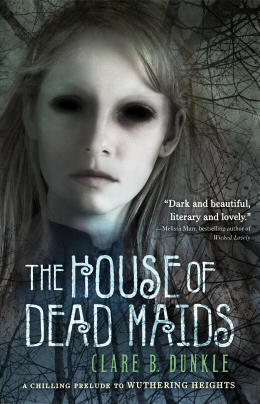 Last week I was contacted by Barbara Fisch at Blue Slip Media, who’s been recommending and sending review copies to me for nearly fifteen years. Barbara had flagged The House of Dead Maids by Clare B. Dunkle (author of the Hollow Kingdom trilogy), just released in hardcover from Holt, as of possible interest to Black Gate readers. And from her description, it sounded like she could be right:
Last week I was contacted by Barbara Fisch at Blue Slip Media, who’s been recommending and sending review copies to me for nearly fifteen years. Barbara had flagged The House of Dead Maids by Clare B. Dunkle (author of the Hollow Kingdom trilogy), just released in hardcover from Holt, as of possible interest to Black Gate readers. And from her description, it sounded like she could be right:
The House of Dead Maids is billed as a prelude to Wuthering Heights, as it features a character who will come to be known as Healthcliff. The novel is a scary blending of Yorkshire lore and Bronte family history. The child (Heathcliff) is already a savage little creature when Tabby Aykroyd arrives at Seldom House as his nursemaid. The ghost of the last maid will not leave Tabby in peace, and her spirit is only one of many. As she struggles against the evil forces that surround the house, Tabby tries to befriend her uncouth young charge, but her kindness can’t alter his fate.
The real task, as always, was matching the ideal reviewer with the book… a bit more of a challenge for a 151-page book with an eleven year-old narrator, I grant you.
As luck would have it, I happened to have an eleven-year old reader in the house, who innocently picked up the book the day it arrived. I know when the stars have aligned, and sat down with a notepad and pen to interview her minutes after she finished reading The House of Dead Maids.
We’ll call this young reader “Tabitha,” because of what happened when her mother found out I was going to use her picture and real name on the Internet.
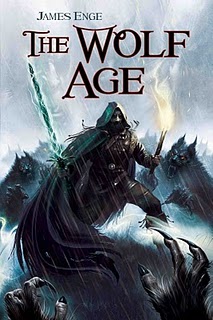 James Enge tells us (rather gleefully) that “A slab of The Wolf Age is up at the Pyr samples site. Werewolves. Ghost-powered zeppelins. The usual stuff.”
James Enge tells us (rather gleefully) that “A slab of The Wolf Age is up at the Pyr samples site. Werewolves. Ghost-powered zeppelins. The usual stuff.”
The Wolf Age is the third novel of Morlock the Maker. Morlock, the soft-spoken hunchback and recovering alcoholic who may also be the finest artificer the world has ever seen — not to mention a formidable swordsman — featured in Enge’s first published story, “Turn Up This Crooked Way,” in Black Gate 8, and has appeared six times (so far) in our pages, most recently in Black Gate 14.
Tired of dominating Black Gate‘s pages with an iron fist, Enge turned to more ambitious goals, producing the first two Morlock novels Blood of Ambrose (2009) and This Crooked Way (also 2009 — it makes other writers look bad, doesn’t it?), both published by Pyr.
Blood of Ambrose was recently nominated for the World Fantasy Award, the obvious next step in Enge’s ruthless plan for domination of Western civilization.
You can read the first two chapters of The Wolf Age at the Pyr website, and see for yourself how Enge’s evil scheme is taking shape. It’s not to late to stop him.
Werewolves. Ghost-powered zeppelins. On second thought, it probably is too late. Join the Black Gate staff in line to sign up as Enge’s evil henchmen, and get your black leather tunics and infrared goggles before they’re all gone.

From the time I was in grade school all the way up until after I graduated from college I wrote in notebooks. It seemed such a natural process that I wonder now how I got away from it, and why it was such a revelation when I took up writing in notebooks again.
In my school days I used to carefully comb through available notebooks and select one with multiple subjects, college-ruled. Usually it would be a spiral-bound Mead, 8 1/2 by 11, but sometimes I’d experiment with slightly smaller sizes. When I was older and wandering through the Kansas City Renaissance Festival with my wife, I purchased a lovely Celtic leather notebook cover with an unlined sketchbook, and I filled a succession of replacement sketchbooks between those covers with my scribbles for years after.
As striking as that notebook was, though, I eventually fell out of using the thing. It became impractical to drag it wherever I went: my student days were over so I no longer had a backpack over one shoulder, and I didn’t have the kind of job where I always toted a briefcase. In those rare instances where I DID have a briefcase, it was already so loaded down that something weighing as much as a hardback book was a nuisance. I never used a notebook for writing unless I was at home, at which point I might as well have been writing on the computer. I thought that I had “outgrown” the use of a notebook.
Back in April we told you about the first volume of this excellent new Clayton Astounding reprint series, compiled by Dark Worlds editor G.W. Thomas: Vagabonds of Space.
Vagabonds collected the best Space Opera from the Clayton years, the first three years of the most honored science fiction magazine in history: January 1930 – March 1933, when it was briefly owned by Clayton Magazines. This was the era before the pulp magazine was renamed Analog in 1960; even before the name was changed to Astounding Science Fiction — when it bore its original title, Astounding Stories of Super-Science, and was edited by Harry Bates, a skilled writer and editor whose landmark 1940 Astounding story “Farewell to the Master” was adapted as the classic film The Day the Earth Stood Still.
The Clayton years preceded the so-called Golden Age of Astounding when, under legendary editor John W Campbell, it discovered and promoted the work of young new writers such as Isaac Asimov, Robert A. Heinlein, and Hal Clement. The fiction in the Clayton Astounding was raw, undiluted Buck Rogers stuff; the tales that first established the genre and defined for the American public what science fiction was all about.
G.W. Thomas followed Vagabonds with Out of the Dreadful Depths, pulp tales of undersea adventure, and now comes the third volume, Planetoids of Peril:
Not the Golden Age Astounding of John W. Campbell but the fun, Bug-Eyed-Monster-filled pulp of SF adventure. This volume is filled with tales of planets and moons covered with alien monsters and terrible chills. Featuring work by Anthony Pelcher, Sewell Peaslee Wright, Edmond Hamilton, Charles W. Diffin, Paul Ernst and Robert H. Wilson. With introductions and commentary by G. W. Thomas.
The Clayton Astounding: Planetoids of Peril is available from Lulu, priced at$13.99 for 218 pages. It’s also available in electronic format for just $4.99.
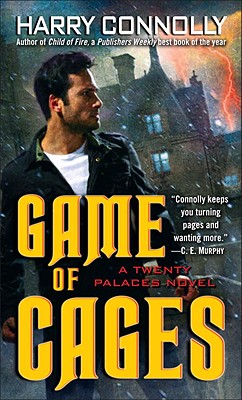 The most interesting title waiting for me when I returned from our adventures at Dragon*Con was Harry Connolly’s Game of Cages, the latest in his Twenty Palaces series and the sequel to his first novel, Child of Fire.
The most interesting title waiting for me when I returned from our adventures at Dragon*Con was Harry Connolly’s Game of Cages, the latest in his Twenty Palaces series and the sequel to his first novel, Child of Fire.
We’ve been big fans of Harry since his first story appeared in Black Gate 2, and his “Soldiers of a Dying God” (BG 10) is one of the finest short pieces we’ve ever published. It’s been great to finally see him get some well-deserved recognition. Child of Fire received some excellent notices, and Jim Butcher said it contained “Excellent reading… delicious tension and suspense.” Here’s the cover copy to Game of Cages:
As a wealthy few gather to bid on a predator capable of destroying all life on earth, the sorcerers of the Twenty Palace Society mobilize to stop them. Caught up in the scramble is Ray Lilly, the lowest of the low in the society — an ex-car thief and the expendable assistant of a powerful sorcerer. Ray possesses exactly one spell to his name, along with a strong left hook. But when he arrives in the small town in the North Cascades where the bidding is to take place, the predator has escaped and the society’s most powerful enemies are desperate to recapture it.
We tracked down Harry at the exclusive club where he now writes, between eating oysters and sipping Châteauneuf-du-Pape. Before we were thrown out by the bankers at the next table, Harry did say a few words about his new novel, which Howard Jones managed to transcribe in the hidden notebook he always carries in his pocket:
Ray Lilly is an ex-con, an ex-car-thief, and current minion in the Twenty Palace Society, a secret organization that protects our world from deadly, magical “predators.” Ray may only be a driver — and a decoy — but he’s the only operative close enough to deal with an emergency situation: An auction has gone terribly wrong releasing a predator into a small town, and the bidders — murderous, wealthy bastards all — tear the town apart looking for it. Ray just has to hold out until his sorcerer bosses arrive, but it may already be too late.
Howard had a few choice words of his own about “wealthy bastards” as we dusted ourselves off, but at least we got an exclusive quote. After his third novel, we’ll probably have to bribe his bodyguards just to get close to Harry. Don’t be one of the last ones to catch on. Check out Game of Cages today — the first three chapters are available online, and the book can be found at better bookstores near you.
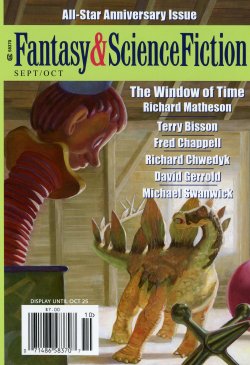 I love these big double issues of Fantasy & Science Fiction (and when did it drop “The Magazine of…” from its name on the cover? A quick look through the back issues I have handy shows it was at least a decade ago, maybe longer. Wow. Thank God my job does not rely on razor-honed powers of observation.)
I love these big double issues of Fantasy & Science Fiction (and when did it drop “The Magazine of…” from its name on the cover? A quick look through the back issues I have handy shows it was at least a decade ago, maybe longer. Wow. Thank God my job does not rely on razor-honed powers of observation.)
Why do I love them? For one thing, these big double issues are BIG. This All-Star Anniversary Issue is 258 pages; including “Orfy,” a big new novella from Richard Chwedyk in his “saur” series about sentient dinosaur toys; four big novelets from Dale Bailey, Fred Chappell, and others; and a big selection of short stories from Michael Swanwick, Terry Bisson, Richard Matheson, and others — including the hilarious “F&SF Mailbag” by David Gerrold, crafted as a series of letters from Gerrold to editor Gordon van Gelder, which opens:
Dear Gordon,
Re: Your recent announcement that you will be outsourcing the jobs of domestic science fiction writers to cheaper-working authors in parallel dimensions.
I take pen in hand to object most strenuously.
Figures Gordon would scoop us — I only wish I’d thought of it first. Speaking of Gordon, when we asked about the issue he told us:
I edited the Sept/Oct issue from the veranda of my palatial estate on Barsoom, where I was watching filming of a new movie. Tried to get Terry Bisson to come visit but he was busy with a political rally. Rich Chwedyk friended me on Facebook and I was surprised to learn that his “saur” stories are nonfiction, location of the real house is undisclosed. The letters cited in the intro to David Gerrold’s story are all real.
The only part I don’t believe is the bit about the letters. You can buy copies at better bookstores for $7, or order a subscription to [The Magazine of] Fantasy & Science Fiction and experience some of the best our field has to offer here.
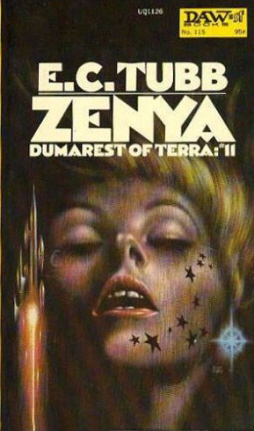 British science fiction author Edwin Charles (“E.C.”) Tubb died on September 10, 2010, at his home in London, England. He was 90 years old.
British science fiction author Edwin Charles (“E.C.”) Tubb died on September 10, 2010, at his home in London, England. He was 90 years old.
Tubb published his first novel, Saturn Patrol, in 1951. Thus began an extraordinary career spanning nearly half a century, and including over 130 novels and more than 230 short stories in magazines such as Astounding/Analog, Galaxy, Nebula, Science Fantasy, and many others. His short story “Little Girl Lost” (1955) was adapted for Rod Serling’s Night Gallery TV series in 1972.
While Tubb received acclaim for much of his early work, including his novel of Martian colonization Alien Dust (1955), and his generation-Starship novel The Space-Born (1956), he is remembered today chiefly for his Dumarest of Terra saga, which began with The Winds of Gath in 1967 .
DAW publisher Don Wollheim commissioned the series, featuring star-hopping adventurer Earl Dumarest and his relentless search for the legendary lost planet of his birth: Earth. The worldwide success of Dumarest of Terra led Tubb to switch almost exclusively to novel writing. Following Wollheim’s death in 1990, Dumarest came to a premature end after 31 novels with The Temple of Truth (1985).
The next novel, The Return, existed for years only in French translation, until it finally appeared in English in 1997 from Gryphon Books. The ending of The Return was inconclusive however, and it was not until 2009 that Tubb, at the urging of his agent (and at the age of 90!), wrote the volume that brought Dumarest of Terra to a true conclusion: Child of Earth (Homeworld Press, 2009).
Later collections of Tubb’s short fiction include The Best Science Fiction of E.C. Tubb (Wildside, 2005) and Mirror of the Night (Sarob Press, 2003). In recent years, and despite failing health, Tubb continued to write and publish, including the first two novels in his sword & sorcery Chronicle of Malkar series, Death God’s Doom (1999) and The Sleeping City (1999), both from Prime; the Space:1999 novel Earthbound (2003), and three novels in the Linford Mystery Library. His dystopian novel To Dream Again was accepted on the day he died, and is scheduled for publication by Ulverscroft in 2011. At least one other new novel, Fires of Satan, is rumored to be under consideration
I admit I’ve never read any E.C. Tubb — his heyday, the early 1970s, was a bit before my time. But he was a fixture on science fiction bookshelves in virtually every bookstore I walked into for over twenty years, as ubiquitous as Asimov, Heinlein, and Frank Herbert. His passing feels like the end of an era.
 Star Soldier by Vaughn Heppner, Book #1 of the Doom Star Series, has reached the Top of Amazon’s bestseller list for Series Science Fiction in its Kindle edition.
Star Soldier by Vaughn Heppner, Book #1 of the Doom Star Series, has reached the Top of Amazon’s bestseller list for Series Science Fiction in its Kindle edition.
Number 2 on the list is the second volume in the series, Bio-Weapon — outselling Dune, Foundation, and Orson Scott Card’s Ender series, among many others. In the general Science Fiction Bestsellers list for Kindle editions, Star Soldier reached #2, second only to the brand new Zero History by William Gibson.
Star Soldier is a full novel, 82,000 words in length, and is available for download for just 99 cents. Here’s the description:
It’s survival of the fittest in a brutal war of extinction! Created in the gene labs as super soldiers, the Highborn decide to replace the obsolete Homo sapiens. They pirate the Doom Stars and capture the Sun Works Ring around Mercury. Now they rain asteroids, orbital fighters and nine-foot drop troops onto Earth in a relentless tide of conquest. Marten Kluge is on the receiving end. Hounded by Thought Police, he lives like an ant in a kilometer-deep city. The invasion frees him from a re-education camp but lands him in the military, fighting for the wrong side. Star Solider is the story of techno hell in a merciless war, with too many surprises for any grunt’s sanity.
Vaughn has sold three really terrific linked Sword and Sorcery tales to Black Gate, the first of which, “The Oracle of Gog,” will appear in our next issue. I asked him to tell us a little bit about the novels:
In many ways Star Soldier is based from my years of reading about the Eastern Front during WWII. Social Unity is like the Soviets. The genetic super-soldiers think like Nazis. Marten Kluge, the hero, just wants to be free. But there is precious little freedom in the Inner Planets of the Solar System in 2350… I’m writing hard these days. I’m working on the third book of the Doom Star Series, Battle Pod.
Congratulations Vaughn!
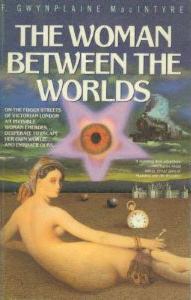 On June 24, Science Fiction author and critic F. Gwynplaine “Froggy” MacIntyre posted a short note in the Community News section of Jeffry Dwight’s SFF.Net, an online community of genre readers and pros. The apparently-casual note was titled, “I am just going outside and may be some time,” the famous last words of Titus Oates, the English explorer who committed suicide during an Antarctic expedition by stepping out into a blizzard.
On June 24, Science Fiction author and critic F. Gwynplaine “Froggy” MacIntyre posted a short note in the Community News section of Jeffry Dwight’s SFF.Net, an online community of genre readers and pros. The apparently-casual note was titled, “I am just going outside and may be some time,” the famous last words of Titus Oates, the English explorer who committed suicide during an Antarctic expedition by stepping out into a blizzard.
Most readers didn’t catch the inference. One astute reader who did called 911, and Froggy was taken into custody, dragged out of his apartment by six police officers while yelling, “I want to die and I’m going to take everyone in the building down with me,” according to a neighbor.
Froggy was released a few hours later. He returned to his home, posted a bitter rant titled “One idiot ruins everything,” and lit a fire in his cluttered apartment that killed him and took a dozen fire trucks and 60 firefighters over an hour to extinguish, according to “Froggy’s Last Story“, the lengthy New York Times article that appeared Friday. The article quotes Black Gate‘s Darrell Schweitzer, Andrew Porter and Bud Webster.
Although he produced only a handful of books, including the novel The Woman Between the Worlds and the anthology MacIntyre’s Improbable Bestiary, Froggy’s short fiction appeared in many outlets, including Analog, Weird Tales, Asimov’s Science Fiction, and Amazing Stories. He was also a respected critic, writing books reviews for The Magazine of Fantasy & Science Fiction for many years. More biographical details are in his Wikipedia entry.
Many of us in the SF & Fantasy community knew Froggy, but few of us knew him as well as we thought he did. His online bio (now taken down) stated his parents had given him up at an advanced age, sending him to an orphan labor camp in Australia, contacting him years later only to ask him to donate a kidney to his twin brother. In the New York Times article, Darrell describes Froggy’s public persona as “basically a character he invented.” Froggy zealously guarded his privacy, and many of the tales he told were seemingly designed to obscure his origins as much as possible.
Whatever the case, Froggy was a talented writer and fan who was with us too briefly. Rest in peace, Froggy.